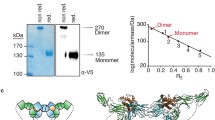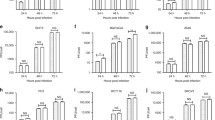Abstract
IL-6 is a pleiotropic cytokine and plays a major role in inflammation and in the immune response. Altered serum levels of IL-6 have been described in several pathologies such as myeloma, EBV-lymphoma and chronic autoimmune disease. Here we report data on the utilization of a hIL-6 receptor superantagonist with a gene therapy approach. The superantagonist used in this work possesses very high affinity for the hIL-6 receptor, and is therefore an excellent candidate for the treatment of IL-6-dependent diseases. To obtain an efficient in vivo delivery method, we constructed a recombinant adenovirus expressing the IL-6 receptor superantagonist by inserting the cDNA, controlled by the RSV promoter, into a first generation replication-incompetent adenoviral vector. Recombinant virus allowed correct expression of the transgene in vitro. Supernatants of infected cells specifically inhibited IL-6-induced transcriptional activation in hepatoma cells and blocked the IL-6-dependent proliferation of human myeloma cells. After intravenous injection of the recombinant virus into mice, nanomolar amounts of antagonist were produced in the serum, and these were able completely to inhibit IL-6 bioactivity. Gene transfer of such an antagonist offers a practical means of imposing long-term blockade of IL-6 activity in vivo for investigational and therapeutic purposes.
Similar content being viewed by others
Author information
Authors and Affiliations
Rights and permissions
About this article
Cite this article
Saggio, I., Ciapponi, L., Savino, R. et al. Adenovirus-mediated gene transfer of a human IL-6 antagonist. Gene Ther 4, 839–845 (1997). https://doi.org/10.1038/sj.gt.3300467
Received:
Accepted:
Issue Date:
DOI: https://doi.org/10.1038/sj.gt.3300467
- Springer Nature Limited




